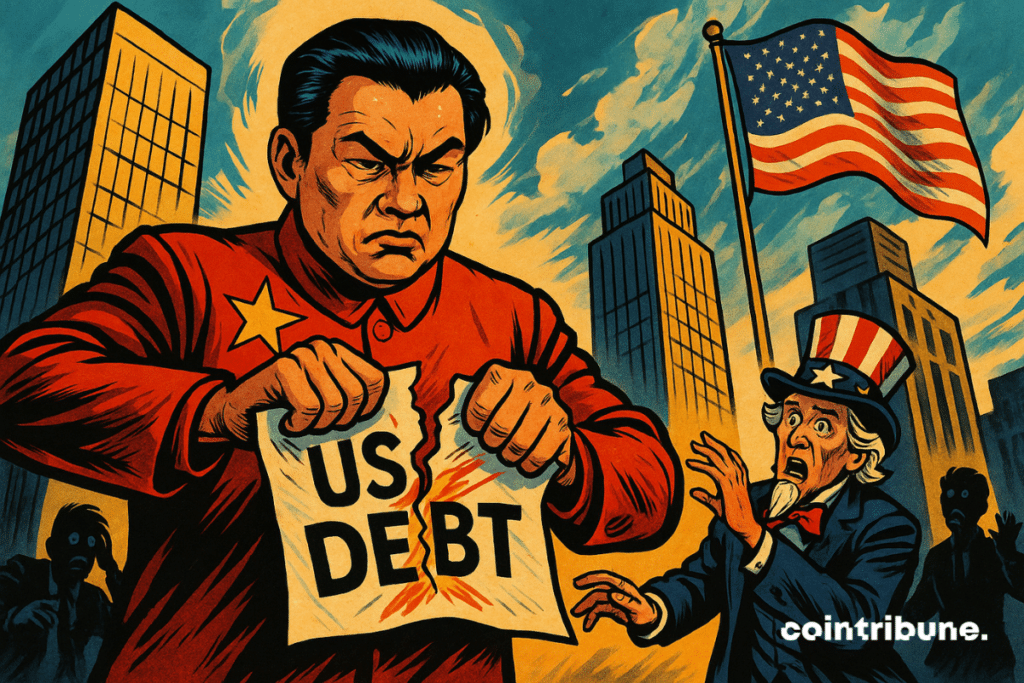China Releases US Debt, Bitcoin Gains Ground
China remains indifferent to threats and continues to dump American debt at the risk of provoking the ire of the White House. Bitcoin lies in wait.

In Brief
- The United Kingdom now holds more US public debt than China.
- Foreign investors now hold only 31% of US debt, down from nearly 60% in 2008.
- Bitcoin is tailored to become a replacement international currency.
The Twilight of the Dollar
The United Kingdom has surpassed China as the second largest global holder of US public debt.
The English ally now holds $779 billion, partly taking the place of the BRICS which are offloading their holdings. China falls back to third place, with $765 billion. Japan remains the top holder, with $1.113 trillion.
Note that the increase in British holdings is not due to trade surpluses, as is the case for Japan and China. London is a global financial center serving as an intermediary for many multinationals, some of which are actually American…
The same observation applies to the Cayman Islands, Luxembourg, Belgium, and Ireland. The dollar reserves of these countries are completely decoupled from their GDP.
China is moving in the opposite direction. After peaking at over $1.3 trillion in 2013, its dollar reserves continue to decline.
The Middle Kingdom has notably shifted towards gold and European bonds. And although China purchased $23 billion in Treasury bills in February, it was not enough to offset its maturing holdings.
Here is a chart summarizing the situation (here the full table of dollar reserves by country):
Geopolitical Tensions
China’s gradual withdrawal reflects rising geopolitical tensions and concerns about the US fiscal situation.
Tax revenues are expected to reach $5.2 trillion in 2025 against expenditures exceeding $7 trillion. Meanwhile, pressure is mounting on the Fed chair, suggesting Republicans have chosen the easy way out. Donald Trump is certainly eyeing a new Quantitative Easing (money printing).
Moreover, China has taken note of the EU freezing €300 billion of Russian reserves. How long before the US does the same with China?
This is why the United States is imposing customs taxes and fueling the flames of the war in Ukraine. Ultimately, the aim is to deter the BRICS from dedollarizing too quickly.
The following chart indeed shows that foreign investors now hold only 31% of US debt, down from nearly 60% in 2008, at the dawn of the subprime crisis and the start of Quantitative Easing…
Brazilian President Lula da Silva recently lashed out at Donald Trump over tariffs, declaring that “No gringo will give orders to this president.”
We’re tired of being subordinate to the North. […] We are discussing the possibility of creating our own currency, or perhaps using our national currencies to trade among ourselves without relying on the dollar. […] I am not obliged to buy dollars to trade with countries like Venezuela, Bolivia, Chile, Sweden, the European Union, or China. We can use our own currencies. Why should I be tied to the dollar, a currency I do not control? It is the United States that prints dollars, not us,” Lula said.
The atmosphere…
And why not Bitcoin?
The BRICS often talk about a new currency, but nothing concrete exists at the moment. It is also likely that such a currency will never exist. Replicating the European model would be extremely risky for such diverse economies and cultures.
And this is a problem. Russia, for example, stopped accepting the Indian rupee for its oil trade early last year. The reason being that India does not produce enough of the products Russia needs, unlike China (High-Tech, vehicles, machinery).
It is partly because of this problem that central banks have accumulated a lot of gold in recent years. Gold remains a universal currency for storing value in the long term.
But the yellow metal does not allow for smooth trading, far from it. Conversely, Bitcoin could relatively easily integrate into financial markets such as the Saint Petersburg International Mercantile Exchange (SPIMEX).
Volumes are today large enough that transaction fees have shrunk over the years. Certainly, Bitcoin is volatile, but the Lightning Network and stablecoins allow mitigating this short-term exchange rate risk.
Stateless, impossible to “freeze,” and existing in absolutely limited quantity, Bitcoin is tailored to become a top international currency.
This is why the United States want to accumulate as many as possible before the rest of the world. It is about hedging against a currency that would allow the world to trade on equal terms.
Donald Trump knows that the United States will sooner or later have to give up the exorbitant privilege to reduce the trade deficit. But better late than soon, because reindustrialization is not done by decree.
Perhaps the United States will sheathe the sword if the rest of the world lets them accumulate enough bitcoins to cushion dedollarization, let’s be optimistic.
Don’t miss our article: Trump: Bitcoin relieves the Dollar as a complement.
Maximize your Cointribune experience with our "Read to Earn" program! For every article you read, earn points and access exclusive rewards. Sign up now and start earning benefits.
Bitcoin, geopolitical, economic and energy journalist.
The views, thoughts, and opinions expressed in this article belong solely to the author, and should not be taken as investment advice. Do your own research before taking any investment decisions.